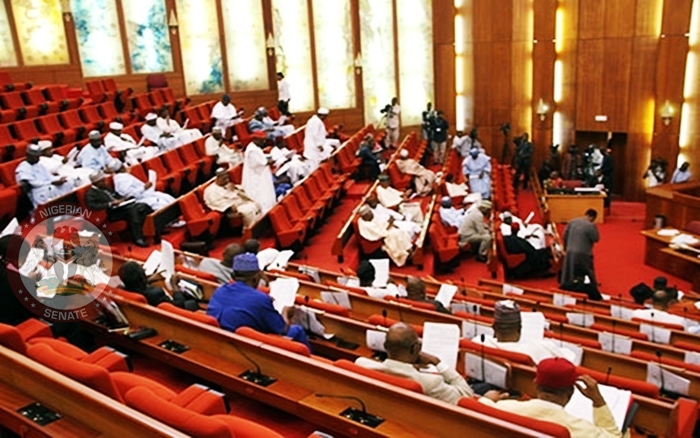The Senate on Wednesday passed the Petroleum Industry Governance Bill, PIGB, a second time, after President Muhammadu Buhari earlier declined assent to the bill.
This followed presentation of the bill at plenary by the Leader of the Senate, Sen. Ahmed Lawan.
The Upper Chamber equally passed six other bills that were hitherto passed and vetoed by Buhari.
The passage of the bills followed clause-by-clause consideration by Committee of the Whole.
The six other bills are Stamp Duties (Amendment) Bill, National Institute of Hospitality and Tourism (Est.) Bill and National Research and Innovation Council (Est.) Bill.
Others are, National Agricultural Seeds Council Bill, Agricultural Credit Guarantee Scheme Fund (Amendment) Bill, as well as the Independent National Electoral Commission, INEC, Act 2010 (Amendment) Bill.
READ ALSO: NUPENG seeks passage of 3 PIB components
President Buhari had declined assent to the bills passed by the National Assembly citing several reasons, including duplication of responsibilities of existing agencies, financial constraints, violation of extant laws, to lack of consultation with relevant stakeholders.
Following the non-assent to the bills, the Senate inaugurated a Technical Committee on Declined Assent to bills, to work on the observations.
The committee thereafter recommended some of the bills for another passage, some for override and others for withdrawal.
While withholding assent to the Petroleum Industry Governance Bill (PIGB) in August 2018, the president expressed reservation with some responsibilities of the Petroleum Regulatory Commission.
He specifically kicked against the provision to retain as much as 10 per cent of the revenue generated by the commission, as well as expansion of the functions of the Petroleum Equalisation Fund, PEF.
In the new bill, the Senate agreed with Buhari’s submission and reduced the revenue generated by the regulatory commission from 10 per cent to five per cent.
It also removed the Petroleum Equalisation Fund, PEF, from the new bill.
It was first introduced into the National Assembly in 2008 as an executive bill by late President Umaru Yar’Adua.
The Sixth National Assembly (2007 – 2011) failed to pass the bill.
It was re-introduced to the National Assembly in 2012 by former President Goodluck Jonathan.
In 2014, only 47 out of the 360 members of the House of Representatives in the Seventh Assembly (2011-2015) were present when the bill was passed a few hours to the end of their tenure.
However, the bill failed to get the constitutionally required concurrence from the Senate.
READ ALSO: Nigerian govt receives 30 megawatts Gurara dam concession certificate
The current proposal is a private member bill sponsored by the Chairman, Senate Committee on Petroleum Upstream, Sen. Tayo Alasoadura, APC, Ondo.
The bill seeks to create efficient and effective governing institutions with clear and separate roles for the petroleum industry.
It seeks to establish a framework for the creation of commercially oriented and profit driven petroleum entities to ensure value addition and internationalisation of the petroleum industry.
Furthermore, the bill seeks to promote transparency and accountability in the administration of petroleum resources of Nigeria, while fostering a conducive business environment for petroleum industry operations across the country.
NAN






